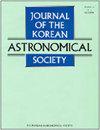蛇夫座ρ分子云复合体的分形维数
IF 0.8
4区 物理与天体物理
Q3 ASTRONOMY & ASTROPHYSICS
引用次数: 3
摘要
我们估计了蛇夫座ρ分子云复合体的分形维数,它与恒星形成区域有关。我们选择了一个立方体(v, l, b)数据库,该数据库使用五校射电天文台14米望远镜上的多波束接收系统,以12 CO和13 CO的J = 1−0过渡线获得,分辨率为22 "。使用IRAF开发的代码,我们确定了具有两个阈值温度的切片云,以估计分形维数。在阈值温度为2.25 K (3σ)和3.75 K (5σ)的条件下,计算得到目标云的分形维数为D = 1.52 ~ 1.54,其中P∝A D/2,比之前的结果大。我们建议,在估计分形维数时,观测数据的采样率(空间分辨率)必须是一个重要参数,并且在任意拟合线周围更窄或更宽的色散和NP = 100处的截距应该检查它们是否与rms噪声水平或目标云的特征结构有关。这个问题可以通过分析几个不同质量(低或中等灵敏度)的高分辨率数据库来调查。本文章由计算机程序翻译,如有差异,请以英文原文为准。
The Fractal Dimension of the ρ Ophiucus Molecular Cloud Complex
We estimate the fractal dimension of the ρ Ophiuchus Molecular Cloud Complex, associated with star forming regions. We selected a cube (v, l, b) database, obtained with J = 1−0 transition lines of 12 CO and 13 CO at a resolution of 22′′ using a multibeam receiver system on the 14-m telescope of the Five College Radio Astronomy Observatory. Using a code developed within IRAF, we identified slice-clouds with two threshold temperatures to estimate the fractal dimension. With threshold temperatures of 2.25 K (3σ) and 3.75 K (5σ), the fractal dimension of the target cloud is estimated to be D = 1.52–1.54, where P ∝ A D/2 , which is larger than previous results. We suggest that the sampling rate (spatial resolution) of observed data must be an important parameter when estimating the fractal dimension, and that narrower or wider dispersion around an arbitrary fit line and the intercepts at NP = 100 should be checked whether they relate to rms noise level or characteristic structure of the target cloud. This issue could be investigated by analysing several high resolution databases with different quality (low or moderate sensitivity).
求助全文
通过发布文献求助,成功后即可免费获取论文全文。
去求助
来源期刊

Journal of the Korean Astronomical Society
地学天文-天文与天体物理
CiteScore
1.30
自引率
10.00%
发文量
0
审稿时长
>12 weeks
期刊介绍:
JKAS is an international scientific journal publishing papers in all fields of astronomy and astrophysics. All manuscripts are subject to the scrutiny of referees. Manuscripts submitted to JKAS must comply with the ethics policy of JKAS. Six regular issues are published each year on February 28, April 30, June 30, August 31, October 31, and December 31. One year''s issues compose one volume.
 求助内容:
求助内容: 应助结果提醒方式:
应助结果提醒方式:


